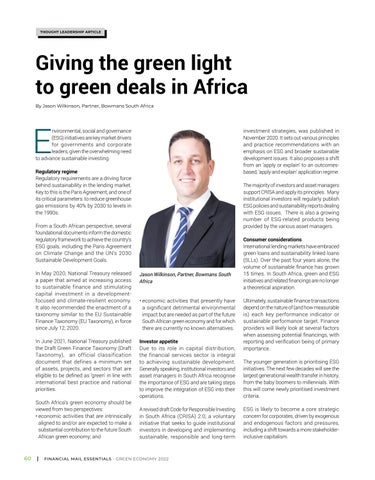THOUGHT LEADERSHIP ARTICLE
Giving the green light to green deals in Africa By Jason Wilkinson, Partner, Bowmans South Africa
E
investment strategies, was published in November 2020. It sets out various principles and practice recommendations with an emphasis on ESG and broader sustainable development issues. It also proposes a shift from an ‘apply or explain’ to an outcomesbased, ‘apply and explain’ application regime.
nvironmental, social and governance (ESG) initiatives are key market drivers for governments and corporate leaders, given the overwhelming need to advance sustainable investing. Regulatory regime Regulatory requirements are a driving force behind sustainability in the lending market. Key to this is the Paris Agreement, and one of its critical parameters: to reduce greenhouse gas emissions by 40% by 2030 to levels in the 1990s.
The majority of investors and asset managers support CRISA and apply its principles. Many institutional investors will regularly publish ESG policies and sustainability reports dealing with ESG issues. There is also a growing number of ESG-related products being provided by the various asset managers.
From a South African perspective, several foundational documents inform the domestic regulatory framework to achieve the country’s ESG goals, including the Paris Agreement on Climate Change and the UN’s 2030 Sustainable Development Goals. In May 2020, National Treasury released a paper that aimed at increasing access to sustainable finance and stimulating capital investment in a developmentfocused and climate-resilient economy. It also recommended the enactment of a taxonomy similar to the EU Sustainable Finance Taxonomy (EU Taxonomy), in force since July 12, 2020.
Jason Wilkinson, Partner, Bowmans South Africa
In June 2021, National Treasury published the Draft Green Finance Taxonomy (Draft Taxonomy), an official classification document that defines a minimum set of assets, projects, and sectors that are eligible to be defined as ‘green’ in line with international best practice and national priorities.
Investor appetite Due to its role in capital distribution, the financial services sector is integral to achieving sustainable development. Generally speaking, institutional investors and asset managers in South Africa recognise the importance of ESG and are taking steps to improve the integration of ESG into their operations.
South Africa’s green economy should be viewed from two perspectives: • economic activities that are intrinsically aligned to and/or are expected to make a substantial contribution to the future South African green economy; and
60
|
• economic activities that presently have a significant detrimental environmental impact but are needed as part of the future South African green economy and for which there are currently no known alternatives.
A revised draft Code for Responsible Investing in South Africa (CRISA) 2.0, a voluntary initiative that seeks to guide institutional investors in developing and implementing sustainable, responsible and long-term
FINANCIAL MAIL ESSENTIALS • GREEN ECONOMY 2022
Consumer considerations International lending markets have embraced green loans and sustainability linked loans (SLLs). Over the past four years alone, the volume of sustainable finance has grown 15 times. In South Africa, green and ESG initiatives and related financings are no longer a theoretical aspiration. Ultimately, sustainable finance transactions depend on the nature of (and how measurable is) each key performance indicator or sustainable performance target. Finance providers will likely look at several factors when assessing potential financings, with reporting and verification being of primary importance. The younger generation is prioritising ESG initiatives. The next few decades will see the largest generational wealth transfer in history, from the baby boomers to millennials. With this will come newly prioritised investment criteria. ESG is likely to become a core strategic concern for corporates, driven by exogenous and endogenous factors and pressures, including a shift towards a more stakeholderinclusive capitalism.
